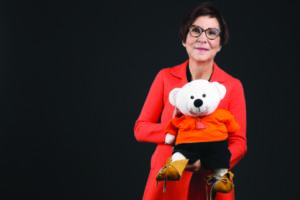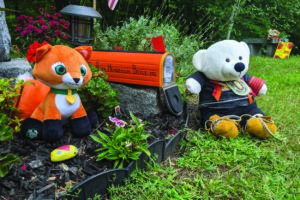Marina’s Picks is a regular feature from CanadaHelps CEO, Marina Glogovac, highlighting some of the many charities she is personally passionate about. As a champion for smaller charities, Marina wants to help fellow Canadians discover some of the lesser known organizations that are working to make our communities better.
 Dr. Cindy Blackstock and Spirit Bear, a sacred representation of the 165,000 First Nations children impacted by the First Nations child welfare case at the Canadian Human Rights Tribunal.
Dr. Cindy Blackstock and Spirit Bear, a sacred representation of the 165,000 First Nations children impacted by the First Nations child welfare case at the Canadian Human Rights Tribunal.
Dr. Cindy Blackstock, the Executive Director of the First Nations Child & Family Caring Society (the Caring Society), and Professor of Social Work at McGill University has been standing up for the rights of First Nations children for decades. The Caring Society, based in the traditional unceded territory of the Algonquin Anishinabe Nation in Ottawa, uses a reconciliation framework to help ensure the safety and well-being of First Nations children, youth and their families through education initiatives, public policy campaigns, and providing quality resources to support communities. They champion culturally based equity for First Nations children and their families so kids can grow up safely at home, be healthy, achieve their dreams, celebrate their languages and culture, and be proud of who they are.
Like most charities in Canada, their team is small (they have only six employees). It was founded as a grassroots organization in the mid-1990s by First Nations people across the country (including Blackstock) who were serving children and families. There was no national network nor information resources, and they were battling against the underfunding of First Nations children’s services by the federal government. As Blackstock describes it:
“We didn’t even know if there was a list of people providing First Nations child and family services. We just got on a fax machine and sent out a letter to literally everyone we knew—just hoping the ‘Moccasin Telegraph’ would kick in. We invited people to come to a meeting—we had no money, nothing to offer people—and 60 people flew in at their own expense and said ‘we have to do this.’ We had a larger gathering at Squamish Nation—again, no money so the community donated fish in the hall—and that’s how we ran this thing and that was the birth of the Caring Society.”
The organization had to pivot in response to COVID. Instead of travelling 200 days a year to visit First Nations and other communities and running in-person education events, Blackstock and her team turned their focus to developing ways for people of all ages and backgrounds to learn about reconciliation and support culturally-based equity remotely, along with continuing to develop resources to support communities. This included hosting virtual film screenings and distributing close to 1,000 Spirit Bear books for children (available in English, French and Indigenous languages) about human rights and meaningful reconciliation. They are also working with Beechwood Cemetery and the City of Ottawa to update historic plaques around the city to more accurately tell the story of Canada’s history with Indigenous Peoples.
The Caring Society is one of few non-government funded organization that serves First Nations, Metis or Inuit peoples. The organization is adamant that reconciliation means ending inequalities, including the continued underfunding of on-reserve education, healthcare, and infrastructure to ensure First Nations kids have the same opportunities as all other kids in Canada. In 2016, they joined with the Assembly of First Nations to bring a human rights complaint against the Canadian government alleging discrimination against First Nations children and families—and they won. Blackstock says, through litigation, First Nations kids got access to close to a million services and products that they otherwise would not have received, and over $750M more in family support services—which for some communities, was the first increase in prevention services for families in 28 years. “So it’s been totally worth it.” Blackstock says. “Dealing with the government’s resistance is still a part of the colonial mindset, but that’s why the public is so important. We can get the public to be more aware so they’re not going to put up with this anymore, regardless of who’s in power, and that’s really our end game.”
Orange Shirt Day and the National Day for Truth and Reconciliation
For the Caring Society, Orange Shirt Day and the new National Day for Truth and Reconciliation are opportunities to engage the public. “We’re very cautious about saying this is the one day you wear an orange shirt and then you’re done,” says Blackstock.
This year on September 30th, the Caring Society is working with partners, the Assembly of Seven Generations (A7G), Beechwood Cemetery, and Project of Heart, to host an all-ages event for people to learn about Canada’s history in the spirit of truth and reconciliation, reflect on the legacy of the residential school system and take action. The event includes the first-ever full public display of 57,000 tiles made by children and youth across Canada to honour the children who attended residential schools as part of the Project of Heart education program. The tiles will be arranged in the shape of a river, and a canoe will be placed in the river.
To help all people in Canada participate in reconciliation, the Caring Society creates free resources for individuals, children, and educators. “The Truth and Reconciliation Commission’s Calls to Action are residential school Survivors’ work plan for the country,” said Blackstock. “These aren’t unsolvable issues. They have been researched and worked on by First Nations and allies for decades. All we really need to do is collectively say ‘now is the time to do it.’ We’re going to keep talking until they get implemented and change happens for kids.”
 Spirit Bear with Beechwood Cemetery’s Echo the Fox, a companion for children during funeral services, at the grave of Dr. Peter Bryce.
Spirit Bear with Beechwood Cemetery’s Echo the Fox, a companion for children during funeral services, at the grave of Dr. Peter Bryce.
What steps can Canadians take to advance reconciliation?
- The Caring Society has 7 free ways to make a difference that are linked to the TRC’s Calls to Action. For families, children, and educators, the Caring Society’s Spirit Bear page offers a variety of free learning resources.
- Read the Truth and Reconciliation Commission’s 94 Calls to Action, and the Missing and Murdered Indigenous Women and Girls Calls for Justice. The Caring Society also has a child-friendly version of the Calls to Action on its website (which many adults appreciate as well).
- Read the Touchstones of Hope Reconciliation Framework, generated by over 200 Indigenous and non-Indigenous leaders in child welfare to guide reconciliation and provide a values framework for restructuring First Nations, Metis and Inuit children services and other areas like research, education and workplace environments.
- Make your commitments to truth and reconciliation, and share them in a letter. Dr. Blackstock maintains the grave and mailbox of Dr. Peter Bryce, once Chief Medical Officer of the Department of the Interior and early whistleblower on residential schools. Send your letters to Dr. Bryce c/o Beechwood Cemetery, 280 Beechwood Avenue, Vanier, ON K1L 8A6
- Learn about the Spirit Bear Plan. Supported by First Nations across Canada, the Spirit Bear Plan sets out concrete actions that Canada can take, immediately, to end the inequalities in public services for First Nations children, youth and families.

I encourage you to check out and support this inspirational charity that is working so hard to support the community it works in. Learn more about First Nations Child and Family Caring Society Foundation on their website, or make a gift through their CanadaHelps Charity Profile.
One Response to “Marina’s Picks: First Nations Child & Family Caring Society”
Lucille Robertson
First goal: To identify the missing children, and mark their graves. List their names on an appropriately-sized memorial in that area.
•